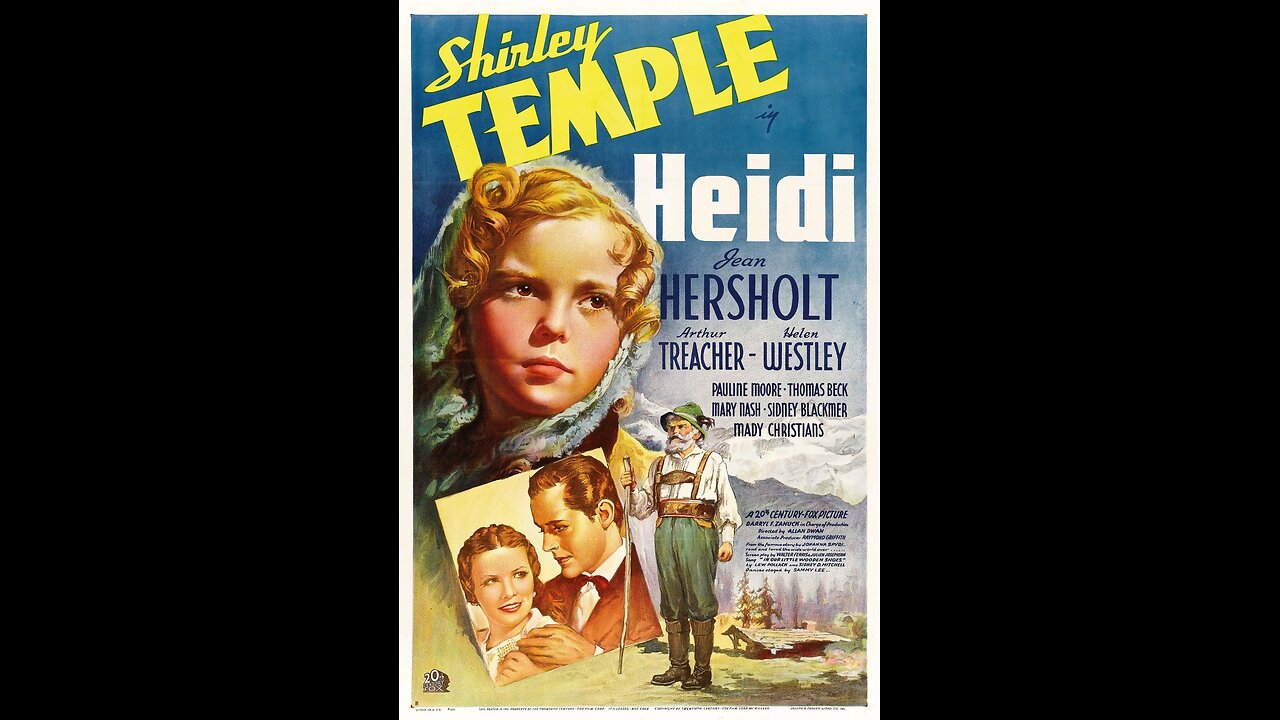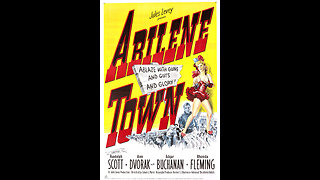Premium Only Content

Heidi (1937) | Directed by Allan Dwan
"Heidi" is a classic family film directed by Allan Dwan, based on the 1880 novel by Johanna Spyri. The story revolves around a young orphaned girl named Heidi (Shirley Temple) who is sent to live with her reclusive grandfather, Adolph Kramer (Jean Hersholt), in the Swiss Alps. Despite initial challenges, Heidi's presence brings joy to her grandfather and the people of the village. However, her life takes a turn when her aunt takes her away to live with a wealthy family in the city, causing emotional upheaval for Heidi and those she cares about.
Shirley Temple's Charming Performance:
Shirley Temple, known for her talent and charm, delivers a heartwarming performance as Heidi. Her portrayal captures the innocence, resilience, and infectious joy of the character. Temple's screen presence and ability to connect with the audience contribute significantly to the film's success.
Scenic Beauty and Cinematography:
"Heidi" benefits from its breathtaking cinematography that showcases the scenic beauty of the Swiss Alps. The film captures the picturesque landscapes, creating a visually stunning backdrop for the narrative. The cinematography adds to the immersive quality of the storytelling, transporting the audience to the idyllic world of the Alps.
Emotional Resonance and Family Themes:
At its core, "Heidi" explores themes of family, belonging, and the transformative power of love. The emotional resonance of the film is heightened through Heidi's relationships with her grandfather, Peter the goatherd (Marcia Mae Jones), and the people of the village. The film successfully tugs at the heartstrings, evoking empathy and warmth from the audience.
Character Development and Relationships:
The film invests time in developing the characters, particularly the relationship between Heidi and her grandfather. Adolph Kramer's transformation from a stern and isolated figure to a loving grandfather under Heidi's influence adds depth to the narrative. The bonds formed between Heidi, Peter, and other characters contribute to the film's emotional depth.
Adaptation of the Source Material:
"Heidi" remains faithful to Johanna Spyri's novel while adapting it for the screen. The screenplay captures the essence of the original story, preserving its themes of optimism, resilience, and the importance of human connections. The adaptation successfully translates the beloved literary character into a compelling cinematic experience.
Musical Score and Atmosphere:
The film's musical score complements the narrative, enhancing the emotional and atmospheric elements. The music contributes to the overall tone of the film, creating a sense of enchantment and nostalgia. The use of music aligns with the classic storytelling style prevalent in family films of the era.
Universal Themes and Timeless Appeal:
"Heidi" explores universal themes that resonate across generations. The film's emphasis on the values of kindness, empathy, and the importance of family makes it a timeless piece of cinema. The narrative's simplicity and universal appeal contribute to the enduring popularity of "Heidi" as a family classic.
Critical and Commercial Success:
"Heidi" received positive reviews upon its release and was a commercial success. Shirley Temple's performance, coupled with the film's emotional resonance and visual beauty, garnered praise from both critics and audiences. The film's enduring popularity has solidified its status as a beloved classic.
Conclusion:
"Heidi" stands as a classic family film that captures the essence of Johanna Spyri's beloved novel. Shirley Temple's endearing performance, combined with stunning cinematography and a compelling narrative, makes it a timeless and heartwarming cinematic experience. The film's exploration of universal themes ensures its continued relevance and appeal for audiences of all ages.
-
 1:29:32
1:29:32
Classic Films & Movies Archive
2 days agoAbilene Town (1946) | Directed by Edwin L. Marin
1201 -
 2:41:03
2:41:03
BlackDiamondGunsandGear
4 hours agoAfter Hours Armory / DLD & Mike w- CMMG / 4th of July Show!!
12.3K -
 2:10:37
2:10:37
Tundra Tactical
4 hours ago $5.43 earned🔫 World's Okayest Firearm Live Stream: GunCon Drama, NFA Smackdown & Silly 2A Games! 💥
43.8K1 -

Cripiechuccles
6 hours ago😁💚💙SHATTERDAY WITH CRIPIE💚💙RUMLUV ACTIVATE👌COME IN AND SAY HI!!:😁
8.19K -
 2:41:03
2:41:03
DLDAfterDark
3 hours ago $1.48 earnedLet's Talk Suppressors! Feat. Mike From CMMG! The After Hours Armory!
17.4K -
 LIVE
LIVE
Reolock
7 hours agoWoW Classic Hardcore | Level and CHAT | RTMP
72 watching -
 8:00
8:00
MattMorseTV
8 hours ago $11.82 earnedHe just lost EVERYTHING.
33.3K37 -
 4:42:20
4:42:20
FusedAegisTV
8 hours ago$1000 Fortnite Tournament | 19 TEAMS!! #RumbleGaming
41.8K2 -
 3:05:57
3:05:57
Shawn Cav Live
3 hours agowarzone and splitgate | SCL 07.05.25
19.4K -
 1:50:28
1:50:28
Omar Elattar
3 days agoI Asked a $40M Ex-Cop How He Built His Business After DUI & Rehab!
35.3K1